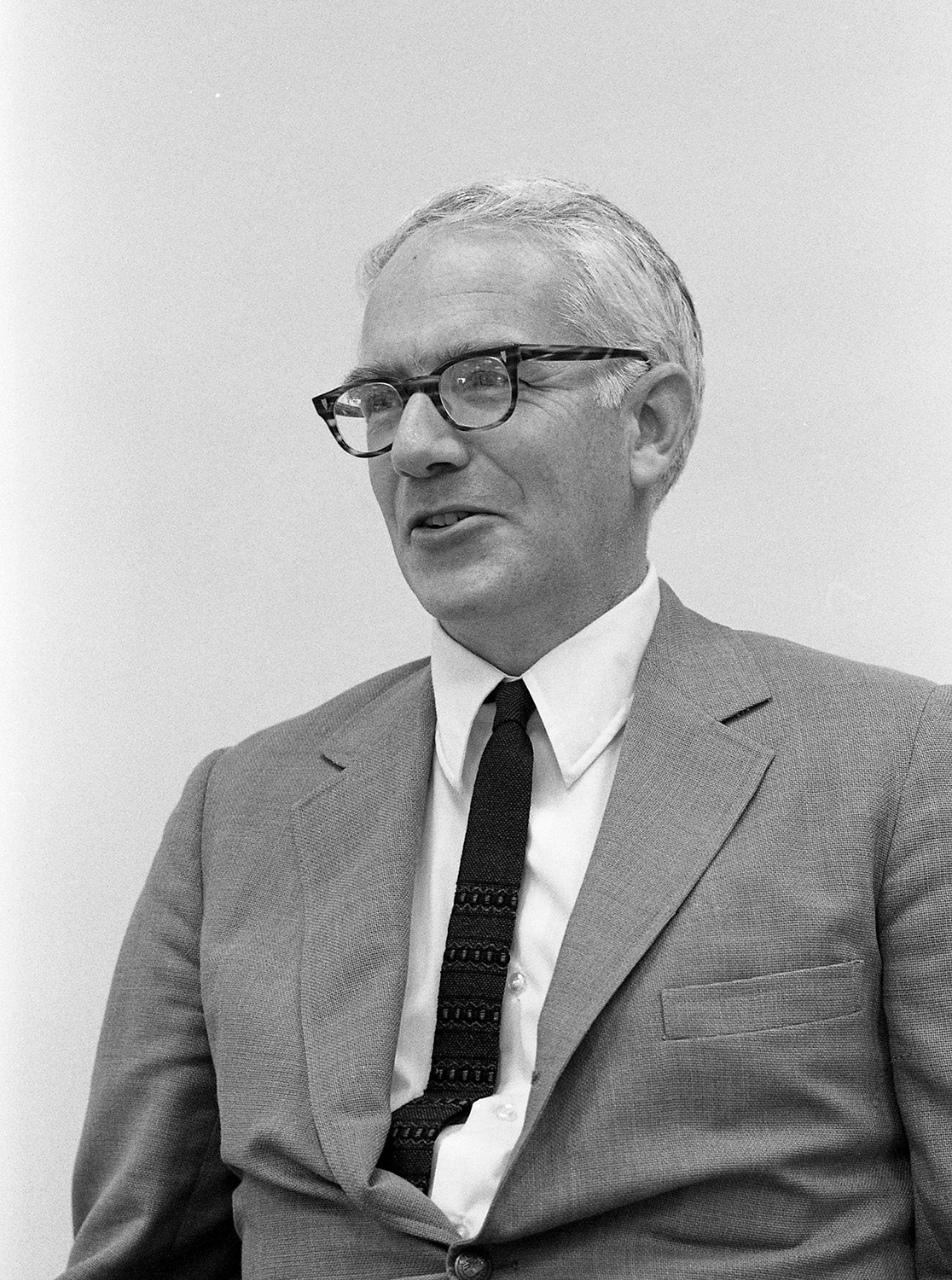Otis Pease, Stanford historian, author and trustee, dies at 85
Popular teacher and historian Otis Pease put his principles into practice: He received a Purple Heart in the Battle of the Bulge, was a volunteer teacher for Mississippi’s “Freedom Summer” of 1964 and tackled controversy as a member of Stanford’s Board of Trustees.
Otis Arnold Pease, a Stanford historian and longtime member of the Stanford Board of Trustees, died Sept. 6 of a heart attack in Seattle’s Northwest Hospital. He was 85.

Otis Pease was remembered for his humor and warm heart as well as for his talents as a teacher and a scholar. (Image credit: Chuck Painter / Stanford News Service)
Pease made his mark as a specialist in 20th-century American history, but he was also active in political causes for social justice – most notably as a volunteer teacher in Mississippi’s 1964 “Freedom Summer” for civil rights.
“Otis was a renowned and beloved teacher and the very model of the ‘gentleman scholar,'” said Stanford historian David Kennedy, a friend as well as a colleague. “He made major contributions to our understanding of what some have called America’s most characteristic industry, advertising.”
Kennedy said that Pease, the author of four books, provided the trustees “with the invaluable perspective of a working teacher and scholar. He was unfailing in friendship and famously helpful to his graduate students and younger colleagues.”
Former Stanford President Richard Lyman called him “a first-rate teacher and productive scholar.”
“He was humorous, warm-hearted, a good listener, empathetic, a really wonderful person,” Lyman said.
Pease was a popular and respected teacher. One of his students, the bestselling author Lauren Kessler, said in a 2007 interview: “He taught me that history isn’t simple.
“He was a dyed-in-the-wool New Dealer, a liberal with a capital L. … Yet he could speak outside of ideology, with great – ” she said and paused, “it’s not sympathy, but it’s just a complexity of understanding.”
Pease was born July 31, 1925, in Pittsfield, Mass., to Frederic and Ruth Pease. He graduated summa cum laude from Phillips Exeter Academy in 1943.
After his first semester at Yale University, he enlisted in the Army, serving from 1943 to 1946 in the infantry and then in the Air Corps. He was awarded a Purple Heart for injuries sustained in the Hürtgen Forest during the Battle of the Bulge in 1944. He used his own diaries of the period and those of others when writing the 2007 book Blueberry Pie: The Meaning of WWII for the Americans Who Fought in It.
He returned to Yale in 1946, majoring in American history and American studies; he was elected to Phi Beta Kappa during his junior year. He earned his BA with high honors in 1949 and his PhD in 1954 at Yale.
Studied the history of advertising
His dissertation, “The Responsibilities of American Advertising, 1920-1940,” received the John Addison Porter Prize. The dissertation resulted in a book, The Responsibilities of American Advertising: Private Control and Public Influence, 1920-1940 – the first serious historical work on aspects of the relationship between advertising and American society.
After a brief stint at the University of Texas, he joined the Stanford faculty in 1956, assuming the William Robertson Coe Professorship in History and American Studies in 1959.
His courses included Age of Big Business and The United States Since 1920. Although his scholarly interests dealt mainly with the political and economic aspects of history in the first half of the century, he also taught a course on the Civil War.
In 1962, he was awarded a Social Science Research Council fellowship to study the urban and organizational roots of American political reform from 1900 to 1930.
In 1966, he joined the Department of History at the University of Washington, where he remained until his retirement in 1995.
The move allowed him to join the Stanford University Board of Trustees in 1969; he served for 16 years. Stanford faculty members do not serve on the board, said Lyman, because of the conflict of interest. As a former faculty member, however, Pease was in a “unique position, a unique situation” when he was invited.
Brought a unique perspective to trustees
On the Academic Affairs Committee, for example, “he brought a knowledge of what it was like to be a faculty member [the trustees] would not have had otherwise,” said Lyman.
Pease did not duck controversy during his years on the board. During a time when many students were pressuring Stanford to divest holdings in South Africa, he met with students at a residence hall in 1978 to tell them that divestment “probably is the least effective weapon the university has in making itself felt” in South Africa.
When he completed his last term in 1985, the trustees commended him: “If on occasion our discussions have strayed afield, he has reminded us with gentle wit and supreme tact that it is Stanford University, not some anonymous and impersonal entity, whose destiny is in our hands.”
His other books include Parkman’s History: The Historian as Literary Artist (1953), a literary history of Francis Parkman, and The Progressive Years: The Spirit and Achievement of American Reform (as editor, 1962).
He is survived by his wife, Donna McCampbell; a brother, Frederic Pease of Dresden, Maine; and four children by his previous marriage to Mary Pease: Jonathan Pease of Portland, Ore.; Catherine Barnhart of San Juan Island, Wash.; Martha Khosa of Portland, Ore.; and Emily Pease of Seattle, as well as eight grandchildren.
A memorial for Pease will be held at 2 p.m. Oct. 24 in Room 130, Kane Hall, on the University of Washington campus.
In lieu of flowers, the family asks for contributions to the Otis Pease Fund for Student Support (History Department, University of Washington, 206-543-2375), the Northwest Chamber Chorus (206-523-1196) or Solid Ground (206-694-6700).
